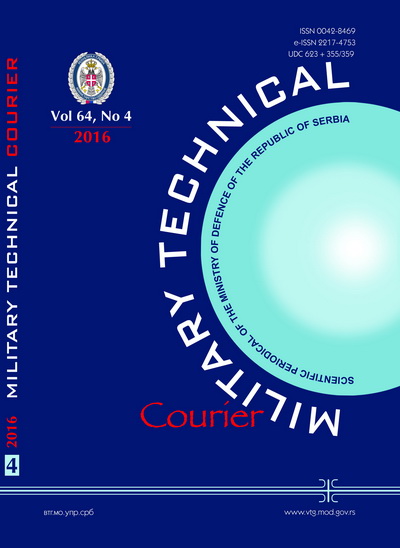Civil defense, leadership and heuristics for the education of headquarters for emergency situations
Abstract
This paper presents solving heuristically conceived problems in the Civil Defence by making adequate decisions in an emergency and the state of emergency with a special emphasis on the application of the heuristic model of training emergency teams-headquarters and on the role of a leader as a factor of good leadership. It is intended for command and teaching staff of the Civil Defence: local authorities (mayors of districts, cities and municipalities - commanders) and the system of protection and rescue (the Sector for Emergency Situations).The heuristic approach to problem solving should enable command staff-leaders from the local to the national level to make adequate decisions in emergency situations after the proclamation of emergency and the state of emergency in a territory part or the whole territory of the Republic of Serbia - functioning of the civil defense and the third mission of the Army of Serbia, as well as to point out the necessity of coordination between the local and national level.
References
Ajduković, G. 2007. Lideri i liderstvo viđeni očima ljudi iz Srbije. In: Zbornik radova: Liderstvo u zemljama tranzicije, FTB.Beograd., pp.17-24.
Amaldi, E., Capone, A., & Malucelli, F., 2003, Optimization models with power control and algorithm. Retrieved from: https://www.google.rs/?gws_rd=cr&ei=kz BUvvEAsWatQbT4YGwBw#q=planning+umts+base+station+location+optimization+models+with+power+control+and+algorithms
Bennis, W.G. 2003. On becoming a leader: The leadership classic: Updated and expanded.USA: Perseus Publishing.
Bereš, P., Bereš, K., Cvetković S. & Jazić R. 2015. Istorijska analiza i heuristika u funkciji edukacije štabova za vanredne situacije / Historical analisys and heuristics as a function of emergency team education: Experience of the CMoD Zrenjanin. Vojnotehnički glasnik / Military Technical Courier, 63(1), pp.67-83.
Bereš, P., & Bereš, K. 2014. Heuristika i operaciona istraživanja u funkciji edukacije subjekata sistema civilne odbrane za vanredne situacije / Heuristics and operational research in emergency situations and civil defence education. Vojnotehnički glasnik / Military Technical Courier, 62(3), pp.152-164.
Bereš, P., 2013, Heuristički model edukacije i prototip sistema za daljinsko aktiviranje sirena u vanrednim situacijama / Heuristic model of education and a prototype of a system for remote siren activation in emergency, Vojnotehnički glasnik / Military Technical Courier, 61(1), pp.46-57.
Hotomski, P.1995. Sistemi veštačke inteligencije.Zrenjanin: Tehnički Fakultet, "Mihajlo Pupin".
Kirkpatrick, S.A., & Locke, E.A. 2001. Leadership: Do traits matter. Academy of Management Executive, 5, pp.48-60.
Klemenović, J. 2007. Filozofsko-etičko utemeljenje ekološkog vaspitanja i obrazovanja - drugi deo. Pedagogija, 3(7), pp.374-384. LXII.
Kvaščev, R. 1978. Modeli procesa učenja.Beograd: Prosveta.
Luthans, F. 2005. Organizational Behaviour.Boston: McGraw Hill.
Nikezić, S. 2011. Organizacija i okruženje.Satcip: Vrnjačka Banja.
Retrived from: http://www.vtg.mod.gov.rs/60godina-fotogalerija-2.html
Proposed Creative Commons Copyright Notices
Proposed Policy for Military Technical Courier (Journals That Offer Open Access)
Authors who publish with this journal agree to the following terms:
Authors retain copyright and grant the journal right of first publication with the work simultaneously licensed under a Creative Commons Attribution License that allows others to share the work with an acknowledgement of the work's authorship and initial publication in this journal.
- Authors are able to enter into separate, additional contractual arrangements for the non-exclusive distribution of the journal's published version of the work (e.g., post it to an institutional repository or publish it in a book), with an acknowledgement of its initial publication in this journal.
- Authors are permitted and encouraged to post their work online (e.g., in institutional repositories or on their website) prior to and during the submission process, as it can lead to productive exchanges, as well as earlier and greater citation of published work (See The Effect of Open Access).

